


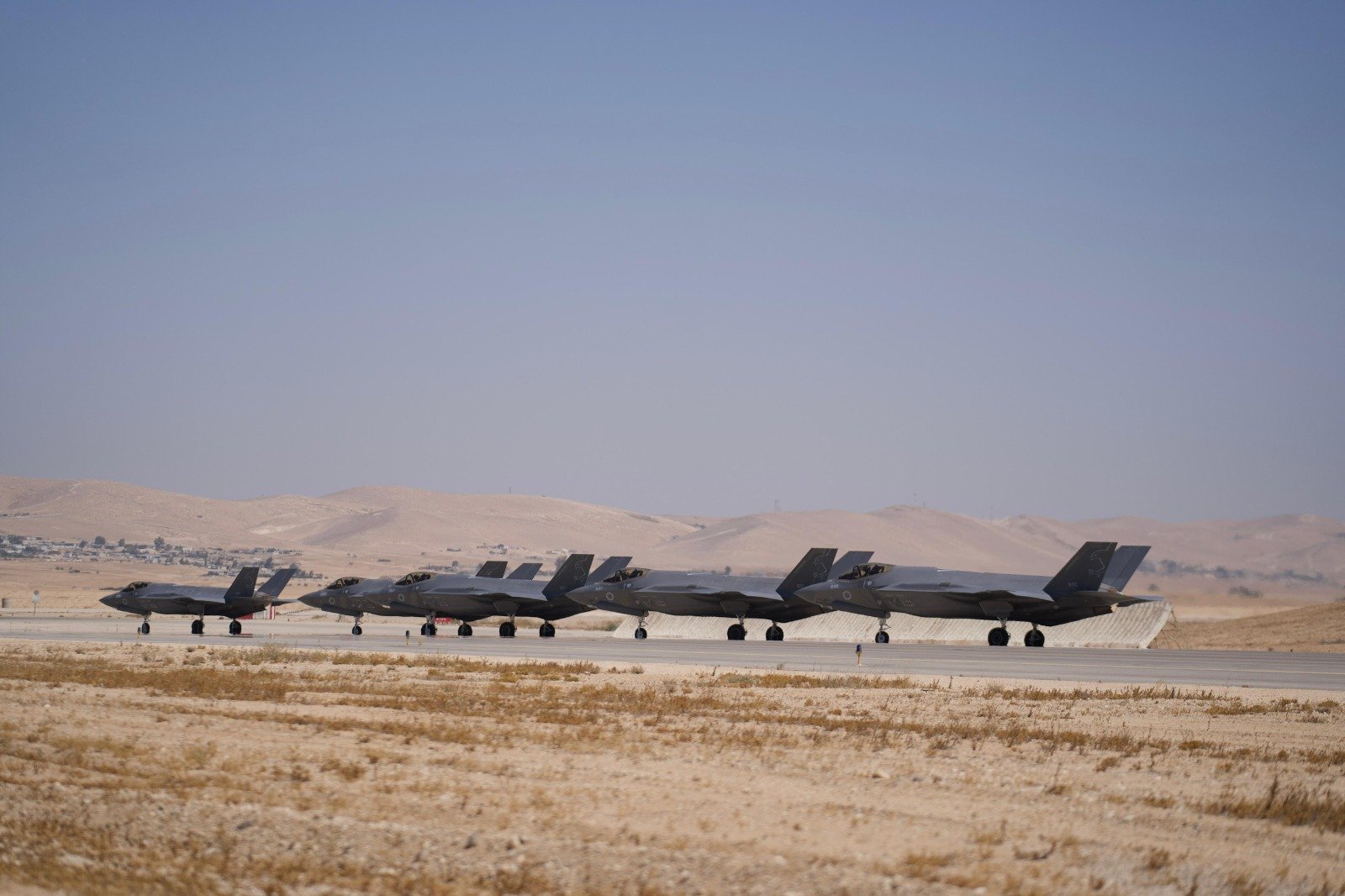
Prime Minister Benjamin Netanyahu said Friday that he had given the order to attack Iran as it had become clear that Tehran’s nuclear and missile programs were building into an immediate existential threat to the Jewish state, with the danger so urgent he was prepared to launch the strikes even without US support.
“If we don’t attack, then it’s 100% that we will die,” he argued in a video statement to the nation, hours after Israel launched blistering attacks on the heart of Iran’s nuclear and military structure Friday, deploying warplanes and drones previously smuggled into the country to attack key facilities and kill top generals and scientists.
Netnayahu said that he had given the directive to to take out Iran’s nuclear program in November 2024 after it became clear that Tehran would move swiftly to build a nuclear weapon after its proxy axis — led primarily the threat of tens of thousands of missiles wielded by Hezbollah — was shattered by Israel.
“The directive came shortly after the assassination of [Hezbollah leader Hassan] Nasrallah,” Netanyahu said, adding that it was clear to him that Iran would rush toward the bomb once Hezbollah no longer posed a threat to Israel.
Israel, he said, identified tangible steps Iran was taking toward weaponization, beyond just uranium enrichment. Netanyahu said set the date for the end of April 2025, however, he pointed to “various reasons” it couldn’t be done then, without going into detail.
One very pressing reason might have been US President Donald Trump’s announcement in April that he would engage in direct talks with Iran over its nuclear program. Trump said he had given the Iranians 60 days to reach a deal. Friday was day 61.
Netanyahu also said that Israel had identified that after Israeli strikes on Iran’s ballistic missile program last year, Tehran embarked on a program to create 300 ballistic missiles a month.
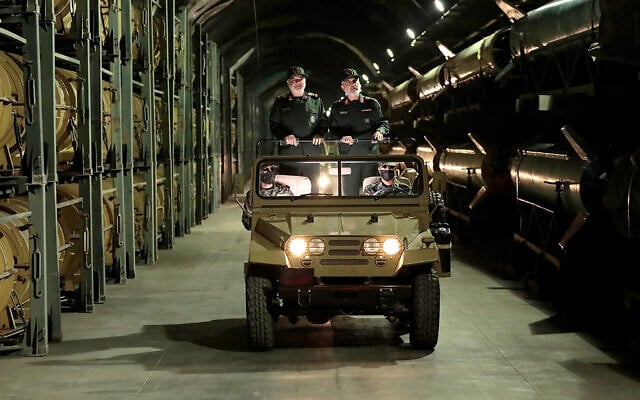
Netanyahu said that would have left Israel facing an arsenal of thousands of missiles, each one topped with a ton of explosives that could be rained down on Israel.
“We decided we couldn’t wait anymore. We are at midnight,” he said.
Despite the success of Israel’s opening salvo, Netanyahu warned the public not to go into euphoria,” and to listen to instructions from authorities.
Iran will strike back, Netanyahu promised: “It will come,” he said, warning that there could be waves of strikes.
Netanyahu said Israel’s first strikes had been “very successful,” hitting a significant part of the Iranian military general staff and the leading nuclear scientists.
Israel destroyed the Natanz plant, according to Netanyahu. The head of the International Atomic Energy Agency later said that Iran reported that a key aboveground component of Natanz was destroyed.
“At Natanz, the aboveground part of the Pilot Fuel Enrichment Plant, where Iran was producing uranium enriched up to 60 percent U-235, has been destroyed,” IAEA nuclear watchdog chief Rafael Grossi told the UN Security Council.
Netanyahu acknowledged that Israel would face challenges dealing with sites such as the Fordo plant near the city of Qom, which is buried under a mountain, but said he would not go into details about how Israel will confront that challenge.
In addition to Natanz , the Air Force struck an Iranian nuclear facility near Isfahan, IDF Spokesman Brig. Gen. Effie Defrin revealed during a press conference.
“We will not allow Iran to advance toward a nuclear [bomb]. We will not allow the development of missiles intended to harm us,” he said.
His comments came after the Mehr news agency reported a “massive explosion” was heard in Isfahan, a major city in central Iran, in a province that is home to several nuclear facilities.
Besides the nuclear sites at Isfahan and Natanz, which Israel has confirmed targeting, there have also been reports and footage of an attack at Fordo.
The IAEA said it was aware of reports concerning Isfahan and Fordo and was seeking information from Iranian authorities regarding any potential impact. Iranian state media claimed limited damage at both sites.
“The damage was limited to areas that did not cause any urban damage in the case of Fordo… In Isfahan, there were also attacks on several points, which were related to warehouses that caught fire,” said agency spokesman Behrouz Kamalvandi, adding that “the damage was not extensive and there is no cause for concern in terms of contamination.”
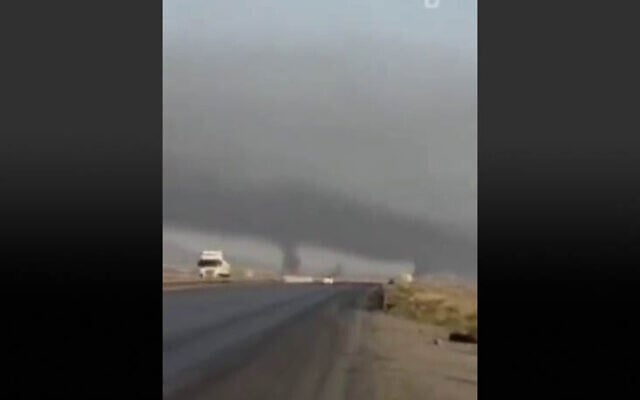
Echoing Netanyahu, his national security adviser also acknowledged that Israel was unlikely to be able to completely destroy Iran’s nuclear program through military strikes.
Speaking to Channel 12, Tzachi Hanegbi said the overall goal of Israel’s campaign, rather, is to pressure Iran militarily into agreeing to completely dismantle its nuclear program.
Earlier Friday, Trump said that Iran still had another chance to strike a nuclear deal after Israel launched its ongoing attack.
Hanegbi also said that Israel does not intend to target Iran’s “political leadership” in this campaign.
However, Channel 12, citing unnamed senior officials, said that Israel had sent a warning to Iran that if civilian population centers were targeted in Iran’s response, Israel would attack the political leaders and major infrastructure, like oil refineries.
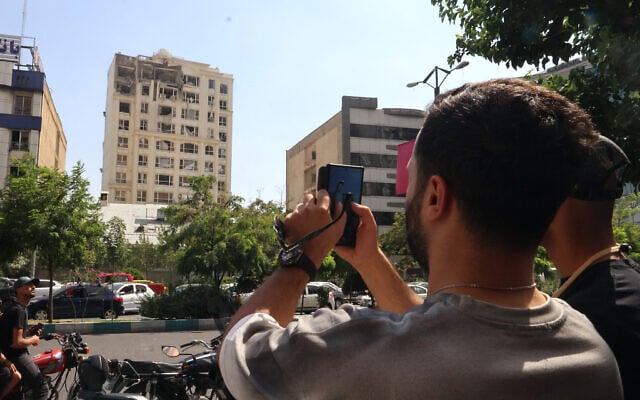
Hanegbi specified that the goals of the ongoing operation, as approved by the cabinet, against Iran were four-fold: striking Iran’s nuclear program, striking its ballistic missile capabilities; attacking its capacity to destroy Israel via a ground attack; and creating the conditions for the long-term thwarting of Iran’s nuclear program via diplomatic means.
Asked if this meant that Israel does not have the goal of “the IDF destroying Iran’s nuclear program,” Hanegbi replies: “That’s not possible. It cannot be done via kinetic means.”
What is possible, he says, is a solution such as played out in Libya, South Africa and elsewhere, where “the balance of pros and cons” leads the leadership of a state to abandon its nuclear weapons efforts.
“Only the Americans can bring that about,” he said. “Only President Trump. He is capable of bringing about what is described as ‘a good deal’ — the model under which Iran, by its choice, gives up on nuclear weapons, pays considerable costs, gets lots of benefits… That’s the diplomatic expectation…”
Netanyahu also addressed the issue of US support, saying that Israel would prefer to have US support, but would go it alone if there was no other choice.
“If we don’t attack, then it’s 100% that we will die,” he argued. “So even if it’s not perfect, we have to do it, because we have to change the direction of Iran’s military build-up, both its ballistic weapons and nuclear weapons.”
“US support, or at least US non-opposition, is something that is extremely desirable,” he continued.
Trump later reiterated that he thought Iran could still agree to a deal. Asked whether the strikes will jeopardize the ongoing negotiations, Trump tells Axios, “I don’t think so. Maybe the opposite. Maybe now they will negotiate seriously.”
He said Iran now has more of an incentive to reach a deal following Israel’s crippling strikes, noting that the IDF used “great American equipment” in the attack.
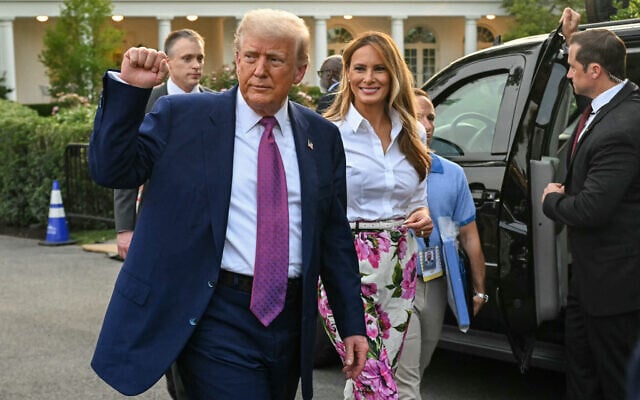
“I gave Iran 60 days, today is day 61… They should have made a deal,” Trump says. “I couldn’t get them to a deal in 60 days. They were close, they should have done it. Maybe now it will happen.”
Speaking later, Netanyahu also addressed the Iranian people, calling on them to unite against what he described as an “evil and oppressive regime”, telling them Israel was engaged in “one of the greatest military operations in history.”
“The time has come for the Iranian people to unite around its flag and its historic legacy, by standing up for your freedom from the evil and oppressive regime,” Netanyahu said.
The ongoing military and intelligence operation raised the potential for all-out war between the countries and propelled the region, already on edge, into even greater upheaval.
Iran quickly retaliated by sending a swarm of drones and later also missiles at Israel, and Supreme Leader Ayatollah Ali Khamenei warned of “severe punishment.” Iran had been censured by the UN’s atomic watchdog a day earlier for not complying with obligations meant to prevent it from developing a nuclear weapon.
Countries in the region condemned Israel’s attack, while leaders around the globe called for immediate de-escalation from both sides. The UN Security Council scheduled an emergency meeting for Friday afternoon at Iran’s request.
In a letter to the council, Iran’s Foreign Minister Abbas Araghchi called the killing of its officials and scientists “state terrorism” and affirmed his country’s right to self-defense. “Israel will come to deeply regret this reckless aggression and the grave strategic miscalculation it has made,” he said.
Israel’s military said about 200 aircraft were involved in the initial attack on about 100 targets. The Mossad spy agency positioned explosive drones and precision weapons inside Iran ahead of time, and used them to target Iranian air defenses and missile launchers near Tehran, according to two security officials who spoke on condition of anonymity.
An Israeli official rejected Iranian state media reports that Iran shot down two of the Israel fighter jets as “fake news.”
“The reports circulating about two Israeli warplanes being shot down are fake news,” the official said on condition of anonymity.
In addition to the attacks on the nuclear sites, Israel said it destroyed dozens of radar installations and surface-to-air missile launchers in western Iran, along with other Iranian air force targets such as drones.
Additionally, the military said fighter jets bombed two airbases in western Iran earlier Friday.
The strikes hit airbases used by Iran’s air force near the cities of Hamadan and Tabriz, the IDF said, adding that the latter site was “destroyed” in the strikes.
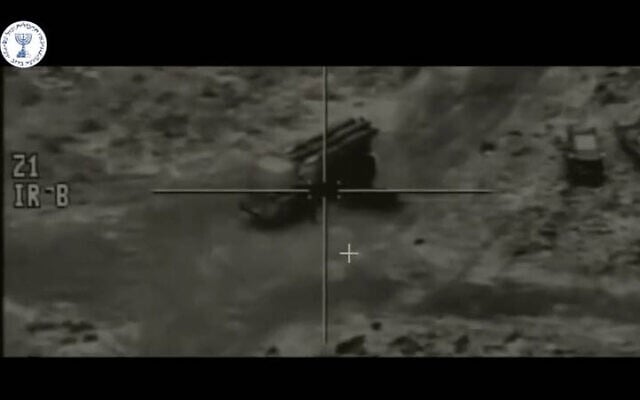
The first wave of strikes had given Israel “significant freedom of movement” in Iran’s skies, clearing the way for further attacks, according to an Israeli military official who spoke on condition of anonymity because he was not authorized to discuss details of the attack with the media.
The official said Israel is prepared for an operation that could last up to two weeks, but that there was no firm timeline and it would depend largely on how Iran responds.
Among those killed were three of Iran’s top military leaders: one who oversaw the entire armed forces, Gen. Mohammad Bagheri; one who led the paramilitary Revolutionary Guard, Gen. Hossein Salami; and the head of the Guard’s ballistic missile program, Gen. Amir Ali Hajizadeh.
Iran confirmed all three deaths, significant blows its governing theocracy that will complicate efforts to retaliate. Khamenei said other top military officials and scientists were also killed.
In its first response Friday, Iran fired more than 100 drones at Israel. Israel said the drones were being intercepted outside its airspace, and it was not immediately clear whether any got through.
Later Friday, Iran fired at least two salvos of dozens of missiles. IDF Spokesman Brig. Gen. Effie Defrin said less than 100 ballistic missiles were fired from Iran at Israel in the two barrages. Most of the missiles were intercepted by air defenses or fell short before reaching the country.
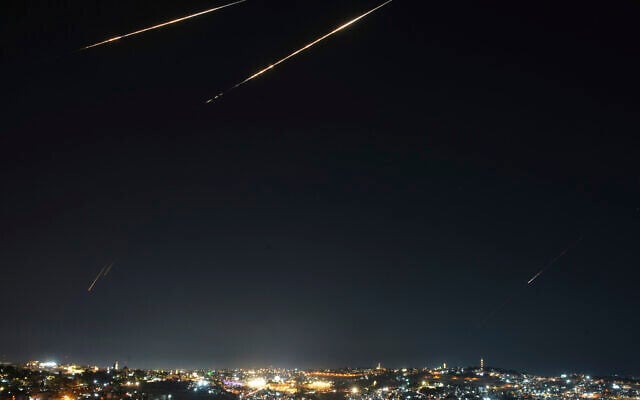
“There are a limited number of impacts on buildings, some were caused by interception fragments,” he said.
Over 60 people were wounded in the missile attack, according to medical officials. One person was listed in critical condition, another was seriously hurt while eight others were moderately injured. The rest were lightly hurt or suffering acute anxiety.
The victims were taken to Beilinson, Sourasky, and Sheba hospitals in central Israel.
Israel’s military also said it called up reservists and began stationing troops in “all combat arenas” throughout the country as it braced for further retaliation from Iran or Iranian proxy groups on its border.
Khamenei, the Iranian Supreme Leader, said in a statement that Israel “opened its wicked and blood-stained hand to a crime in our beloved country, revealing its malicious nature more than ever by striking residential centers.”
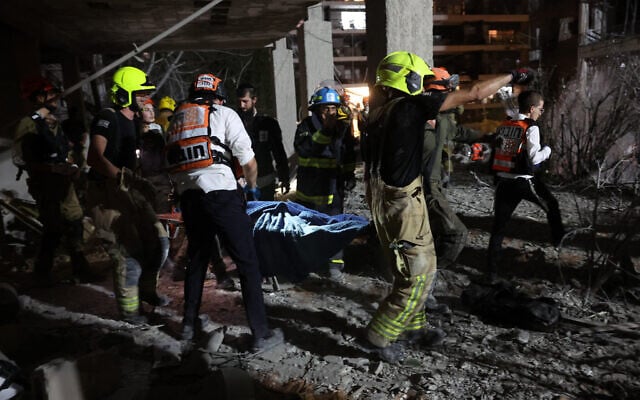
The potential for an attack had been apparent for weeks as angst built over Iran’s nuclear program.
Israel has long been determined to prevent Iran — which routinely calls for Israel’s destruction, from developing nuclear weapons, a concern laid bare on Thursday when the International Atomic Energy Agency for the first time in 20 years censured Iran over its refusal to work with its inspectors. Iran immediately announced it would establish a third enrichment site and install more advanced centrifuges.
Even so, there are multiple assessments on how many nuclear weapons Iran could conceivably build, should it choose to do so. Iran would need months to assemble, test and field any weapon, which it so far has said it has no desire to do. US intelligence agencies also assess Iran does not have a weapons program at this time.
